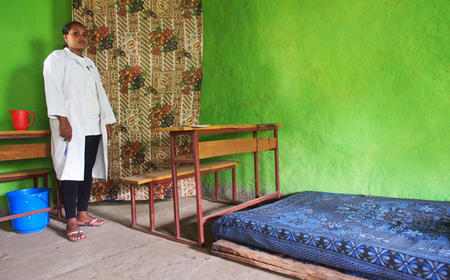Challenging menstrual hygiene taboos

Empowered by their communities, their families and each other, women around the world are working with WaterAid and our local partners to take control of their menstrual health – and make sure having their period doesn’t mean an end to achieving their ambitions.
The Girls' Club, Ethiopia
Mekdes is a teacher at Ras ZeSilas Primary and Junior School in Ethiopia. She's also the co-ordinator of the Girls' Club, and is doing everything she can to improve the day-to-day lives of female pupils when they hit puberty – no easy task in an environment with just one tap for 2,500 students, and two, four-room toilet blocks for the 1,200 boys and 1,300 girls.
"Girls are particularly disadvantaged," Mekdes explains. "Sometimes they experience menstruation in class and if they want to change pads, they have to have some privacy. But the toilets do not have doors."
To deal with this challenge, the school created the 'Modes Room', where girls can access free sanitary towels, change their pads and rest if they get cramps. It's the first step in addressing the girls’ menstrual hygiene needs – although the school still has a long way to go.
"There is no water in the room, so the girls have to go to the only tap," says Mekdes. "Then they have to drop the used pads in the toilet, which is hundreds of metres away on the other side of the school.
"Some girls would still rather stay at home for those three or four days instead of subjecting themselves to all these things."

Seema's female convenience store, India
Girls missing out on school when they have their period is also a big problem in India, where 23% of female students drop out when they hit puberty. Of those that continue, many miss classes up to five days a month, simply because there isn’t a toilet – and then there’s the issue of what to use each month.
"There was a shop selling sanitary products about 4km away but it was run by a man," Seema tells us. "It made women nervous, and the shop didn't always have the items in stock. Now girls can come to my place anytime to buy products."
Seema, who is married with two daughters, set up her own female convenience store in her home after receiving training on reproductive health and hygiene management from WaterAid’s local partner, Vatsalya.
Now, as well as stocking sanitary towels for women and girls in the community, she also shares the good advice she’s been given on staying clean and healthy.
"The girls who come to my shop did not have much knowledge about menstruation, so I raised their awareness," she says. "Before this, they were using any cloth, dirty or tied in a bundle. Once we told them about sanitary pads and they started using them, they were protected from diseases."

Seema and her husband Mohd at the female convenience store she has set up in their home. "When girls come to buy the sanitary products I go to the other side of the house so they can talk freely," says Mohd.
Shikharpa’s sanitary pad project, Nepal
The women of Shikharpa are already training to become market gardeners. But today, gathered in a circle, they're learning a new skill from community activist Usha: how to make their own sanitary pads, using fabric and a simple template.
The women make the pads, which can be washed and re-used, for their own personal use, as well as selling them at the local market. They are both safer and cleaner than anything else available to buy or use.
Young women, mothers, teachers and students have all received the training and the activity itself – not to mention the open discussion of menstrual health – is a sign that attitudes here are changing.
"You still find examples all over Nepal of women who are shunned and separated during their menstruation," says Mani Karmacharya, Communications Officer for WaterAid Nepal. "But within the last ten years or so things have changed, or started to change. The younger generation have access to knowledge about what menstruation really is."

Rewriting the story for girls and women
Around the world, the subject of menstrual hygiene remains shrouded in mystery and stigma, putting girls' and women's health – and futures – in jeopardy.
By working with local partners, and empowering communities to challenge taboos, we support girls and women to develop the knowledge and confidence they need to manage their periods safely. We advocate for the provision of adequate water and space where they can wash and bathe, and for facilities to be made available where they can get rid of their sanitary products with privacy and dignity.
Find out what else we're doing to transform women's lives with safe water and sanitation >

My husband is very happy, my children are also happy. Everyone in my family is happy with this work.
